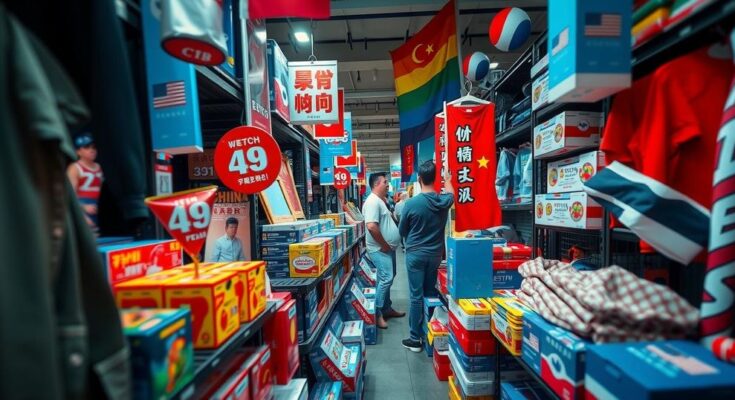As the U.S. presidential election nears, election merchandise from China is flooding the market, adversely affecting domestic manufacturers. Products from e-commerce platforms often undercut U.S. prices, raising concerns about the de minimis loophole allowing tax-free imports of low-cost goods. This situation points to contradictions in the candidates’ trade positions and poses broader implications for American manufacturing.
As the United States presidential election approaches its peak, an increasing number of voters are showcasing their allegiance to their chosen candidates through election-themed merchandise. It has come to light that many of these products, including the well-known “Make America Great Again” hats and “Childless Cat Lady for Harris” T-shirts, are substantially manufactured in China. E-commerce platforms have facilitated an influx of these affordable goods from Chinese suppliers, which has ironically placed domestic manufacturers at a disadvantage. Ben Waxman, the founder and owner of American Roots, a company specializing in American-made apparel, articulated the challenges faced by local producers: “I think the amount of stuff on Amazon and Etsy that’s coming from China and other countries in cargo ships and unloaded on American shores is drastically impacting American manufacturers’, like myself, ability to compete and grow our own business. I think it’s dramatic.” His observations highlight significant price discrepancies, with U.S.-made campaign T-shirts retailing around $15, while similar items on the Chinese e-commerce site Temu are available for as little as $3. The overwhelming quantity of Chinese-made election merchandise on platforms like Temu, Amazon, and eBay is evident, yet comprehensive sales figures for American versus Chinese products remain elusive. On Temu specifically, tens of thousands of election-related items are being sold at substantially lower prices compared to official campaign offerings, revealing a stark contrast that highlights the struggle faced by U.S. manufacturers. This situation is compounded by the de minimis loophole, which allows for goods valued under $800 to enter the U.S. duty-free, further exacerbating competition for U.S. operations. Kim Glas, CEO of the National Council of Textile Organizations, indicated that this abuse has led to significant losses within the domestic manufacturing sector, citing a loss of 21 manufacturing operations in the past 18 months alone. She remarked, “Some of NCTO’s member manufacturers found sales of campaign products are slower this year than in any previous U.S. election cycle.” The implications of this trend are profound, especially given the contrast between the candidates’ rhetoric regarding trade with China and the purchasing behavior of their supporters. Mitch Cahn, president of Unionwear, noted the irony: “If someone is supporting a candidate because of that candidate’s economic policy and their position toward improving our economy and improving our environment…and then they’re supporting a candidate by buying a product that’s made in a country that stands for the opposite of that, they’re actually doing themselves and the candidate and the economy a disservice.” Furthermore, the recent revelations that numerous products associated with Donald Trump, such as his “God Bless America” Bibles, are printed in China have raised eyebrows and sparked criticism. Marc Zdanow, a political consultant, pondered whether this could impact undecided voters: “In past [election] years, this would’ve been a scandal. I think Trump voters just don’t care.” Chris Tang, a business administration professor at UCLA, emphasized the complexity of the situation: “While there are job losses in manufacturing, it creates opportunities for small businesses to import small quantities quickly…” He contended that future U.S. manufacturing initiatives should focus on producing high-value goods rather than inexpensive election merchandise. In summary, the influx of cheap election merchandise from China poses significant challenges to American manufacturers, raising questions about the integrity of campaign support and the overall impact on the U.S. economy.
The article discusses the proliferation of election merchandise manufactured in China as the U.S. presidential election approaches. Many voters are purchasing these items without realizing that they are often not made domestically. This trend is facilitated by e-commerce platforms and has created significant price competition that domestic manufacturers are struggling to meet. The implications reflect broader issues within the U.S. manufacturing sector concerning dependency on Chinese imports and the impact of trade policies.
This examination of the election merchandise market reveals critical contradictions between campaign messaging and consumer behavior. While American manufacturers face uphill battles against lower-priced Chinese imports, the trade policies and consumer preferences highlight challenges that extend beyond mere pricing. Addressing these challenges requires a reassessment of economic strategies to bolster domestic manufacturing and encourage responsible consumer choices that align with purported campaign values.
Original Source: www.voanews.com




